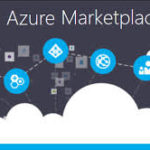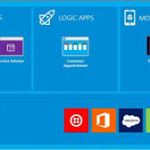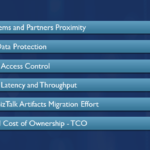B2B Integration Platform: Determining KPIs for logistics & freight-forwarding companies
1. Performance and Scalability
Latency and throughput are the two most important factors that determine performance aspect on an integration platform. This translates into messages/sec and response time in seconds as typical KPIs of an integration platform (See image 1 for BizTalk performance indicators).
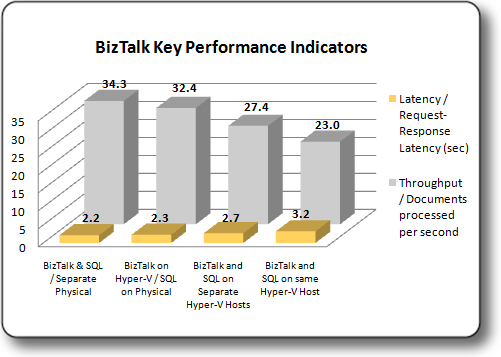
You’ll need to capture the requirements you are setting up for your logistics integration system. For a logistics company that has implemented an integration layer, the performance metric will be determined based on the messages you want to exchange. They can be the following types:
- Contract price
- Shipping line invoice
- Container Status
- Inventory
- Master Data
- ASN
- Cargo
- Purchase order
- Invoice
- Shipment notification
You’ll have different parties (freight forwarders, B2B, B2C, & suppliers) sending and receiving messages (see image below).
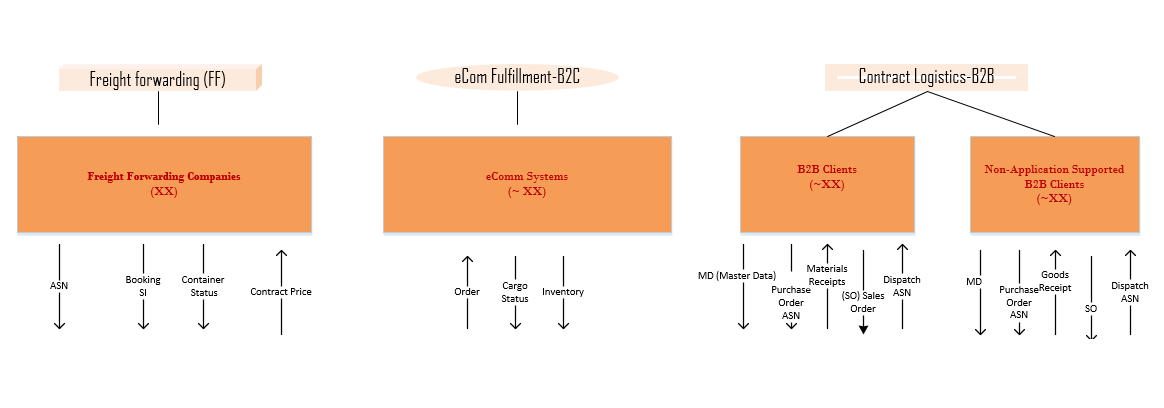
To make an informed decision, you’ll be documenting performance benchmark of your integration solution in terms of shipment orders per day, invoices per day, purchase order per day, how bulky are these messages (file sizes), the frequency of messages, etc. Some of the messages such as contract price has to come by immediately whereas others (such as an order message) can wait for an hour to be processed.
The most common systems used by freight forwarders and contract logistics companies are:
- Warehouse management system (WMS)
- Freight management system
- Order management system (OMS)
During a recent implementation, we benchmarked that all 3 systems handle 3000 messages per day. These will translate into load we consider during performance planning.
Scalability relates to how will the system stretch to fill in more users. The essential thing to look at is how the system will behave if we need to handle 200000 messages. By using BizTalk you can easily add a cluster and let the clusters handle the load balancing.
2. Master data Management
You’ll need a single version of master data for customers, products, transportation network, transportation mode, carrier profile, equipment, rates, costs, and invoicing. New silos of information may create problems on top of the existing data fragmentation. You’ll want to consider the following challenges when managing the master data:
Who’ll map and normalize the data?
What will be the frequency of change?
Who will have the right to normalize and update the master data?
3. Security
This is a no-brainer, but often it is about getting the simple things right.
- Identity: The process of identifying who someone is, using some form of credentials.
- Authentication: The process of identifying what resources someone has access to after being authenticated.
- Authorization: Determining which actions an authenticated principal is authorized to perform on the network. The tasks required to control authorization are also referred to as access management.
- Confidentiality: Confidentiality is roughly equivalent to privacy. Measures taken to ensure confidentiality are designed to prevent sensitive information from reaching the wrong people while making sure that the right people can get it:
4. Error Logging and audit
In case of the U.S based FF companies, compliance with U.S. Customs and Border Protection laws and Export Administration Regulations (EAR) is necessary. Ensure to have Export Control Classification Number (ECCN) appended with the goods you are forwarding.
Timestamping any action performed by users goes a long way to establish the audit trail. Any good b2b integration solution should not miss out on the availability of queryable history of actions performed within the platform. Users with the audit log viewer role will have access to this data.
5. Message recovery
Most probably you’ll be implementing a mission-critical workflow that needs recovery process. Central storage of supply chain messages can enable easy recovery in disaster recovery situations.
Your integration platform should have persistence and be able to recover failed messages without blocking subsequent messages. Just don’t ignore enhanced message recovery capabilities within your solution architecture/platform.
6. Extensibility
Any solution you deploy will evolve over time. Thinking about extensibility of your solution will make sure you know how easy it is to extend the system in a direction not thought of previously. The reason companies opt for BizTalk is that its packed with so many adapters and standards that the company may want to implement later. This helps in using connectors, 3rd party applications and extensions on top of the original solution. A list of 3rd-party adapters compatible with BizTalk can be found here.
You may need to think what extensibility you’ll need in context of freight forwarding and contract logistics operations. You may be looking for support in X12, EDIFACT, and for the common ERPs used in freight and logistics industry (Infor, SAP, Sino Services, etc).
Another trending aspect that freight forwarders may want to look at is going beyond application integration. This can involve device and things-level of integration with the system and this can introduce an enormous amount of load on the system. The perspective and requirement of such device-level integration, therefore, has to be considered before implementing an integration solution.
I think companies will increasingly extend in the direction of integrating internet of things (IoT) and driverless cars. If you are looking for in-transit visibility, you’ll have to start thinking about from the start (introducing cloud-based GPS and Radio Frequency Identification (RFID) technologies can introduce load problems if not planned properly).
7. Availability
Availability requirements in the freight-forwarding industry are pretty high. You should consider availability not only from the software perspective but from a network perspective as well. You should consider the availability of a network at your logistics centers located remotely. Offline capabilities/support become important in this case.
The overall solution should be scalable with highly available architecture to support your business growth and mission-critical processes. Failure-handling capabilities ensure business continuity and minimize the impact of system downtime on business partners.
8. Accessibility
Different language support is another aspect of your integration platform, especially in an export/import scenario.
9. Data retention
Legal restrictions on how long to retain data. This is an important point in that your platform’s data retention policies should be able to reduce risk of compliance failure.
There are different laws application in each country. For instance, Canada’s CBSA regulations (Canada Border Services Agency) require six years of data retentions to be available upon request; and the Patriot Act requires that your data be stored on Canadian soil. For the U.S you may need to look at Export Administration Regulations (EAR) to ensure compliance with the Federal data retention requirements.
10. Synchronicity
Promote synchronicity between your ESB and the larger project by making sure you understand how changes in the larger project, and vice versa, might impact moving parts of the other.

